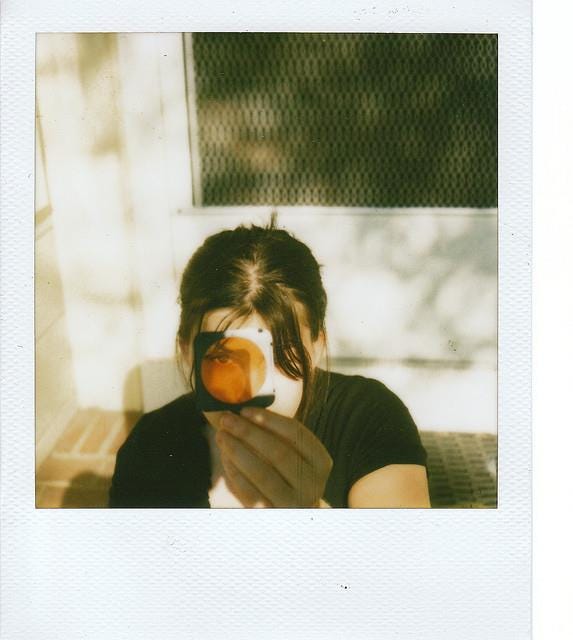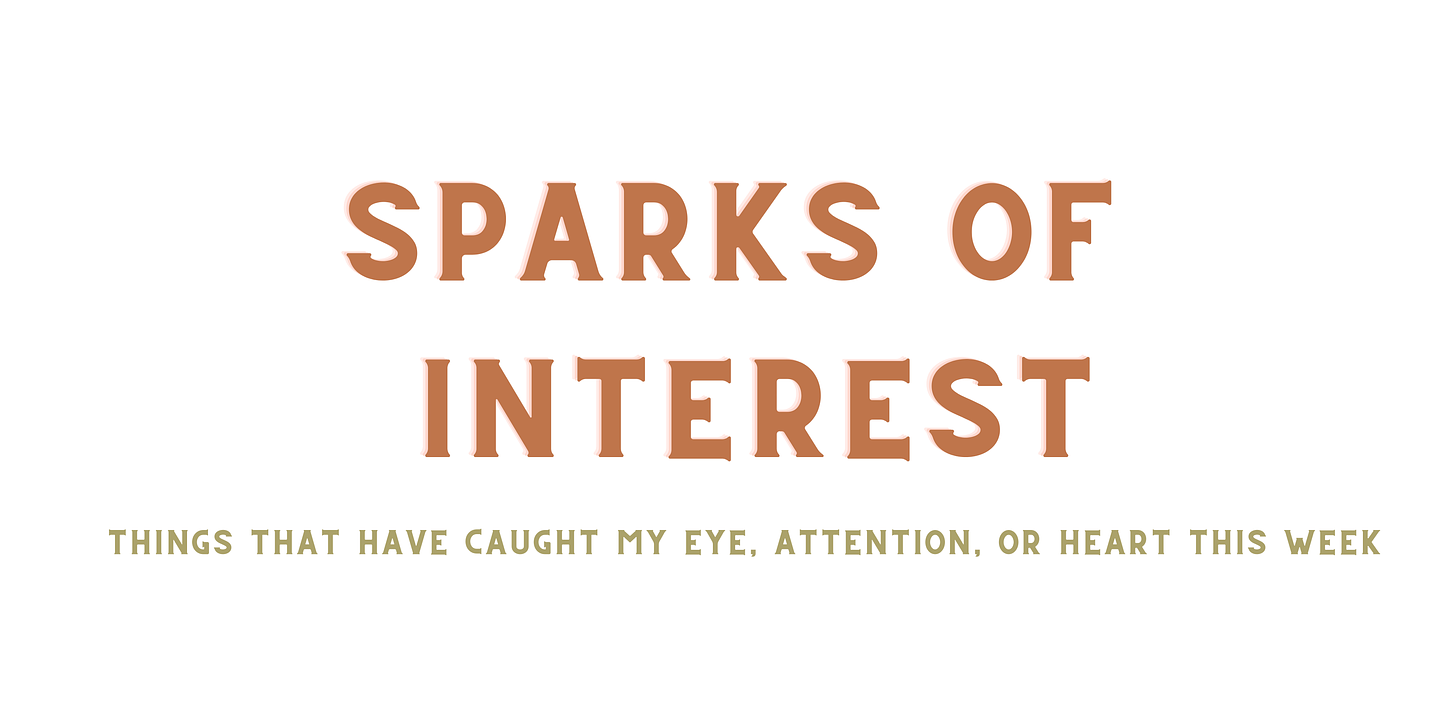Human Stuff is a free weekly newsletter. If you’d like to support my work and also access my monthly reflection guides, I invite you to become a paid subscriber. This is a reader-supported offering and I’m so grateful for your presence here.
Please feel free to share parts of this newsletter that connect with you on social media or send to someone you love.
A song I’m loving:
A note: Today’s letter discusses depression. If that isn’t something you want to read about… feel free to skip this week.
I’ve been spending a lot of time grieving lately — mostly grieving what depression has taken from me over my lifetime. I think about the weeks and years spent in dark places and weep for those versions of me. I think about my current self who feels unable to access some of the things I normally reach for with ease, and I weep. Don’t worry — this letter isn’t only about depression.
When I’m not depressed, I feel a vibrancy and buoyancy. I notice what brings me joy and let it. I go after the things I’m called to with self-belief in tact. I wake up eager and go to sleep rested. I reach out to others without hesitation. I cook new recipes and remember to drink enough water and delight in the sunshine, especially after so much rain. I dance around the living room with my daughter and I try new things and I redecorate and jot down future book ideas or poems on index cards.
When I’m depressed, though, the light is dimmed. Not gone — but noticeably lessened. I find myself not responding to texts or emails, overwhelmed at the prospect. I spend more time in bed, with little motivation or will to get going, like there’s a string attaching me to whatever surface I’m occupying, tethering me to stay put longer than feels good. All the things that support my well-being take too much effort — effort I don’t always have to give. I think about my career or writing path or prospects for what’s next and feel bleakness instead of vigor. I question the truth more — question myself more — question what it’s all for more. A lot of the time, periods of depression are tied to my cycle or life events; often, it isn’t tied to anything at all.
It’s hard to talk about because when others share parts of themselves, we tend to zoom in on those things and forget they’re simply a piece in the kaleidoscope… a sliver of the whole. When I share about depression, you might not know I also spent the morning cackling with my family. When I share about depression, you might not assume I’m also looking out the window awed by the bright red poppy that emerged from the ground last night. When I share about depression, you might not think I’m also preparing for an upcoming writing retreat with the trust that depression won’t take over the rest of me.
Depression is hard to talk about without sounding a) alarming/worrisome, b) clinical, c) blah, or d)self-pitying. It’s something I long kept hidden: first as a child, then as a teen, and later as an adult. I kept it hidden because I thought it made me too fragile for anyone to look in the eye. I thought it turned me into something fixable, which turns others into fixers instead of companions. I thought it lessened my earned wisdom, my knowledge, my capacity to do what I want to do. I thought it gave more leeway for projections and judgments, criticisms and opinions. I thought it discredited me in my work. I thought it provided ample room for others to tell me everything I could to do make it go away, everything I’m not doing that would resolve it, everything I need to process so depression would be gone for good. I thought still moving through it, 25 years and counting, meant I wasn’t working hard enough.
The more wise I grow, the more I know these thoughts (fears) are incorrect. I know they leave out a big piece of the whole picture of my life — of all the parts of me that aren’t depressed, all the time I spend not swallowed up in the fog, all the moments I exist in where depression isn’t lingering over like a ghost. The more wise I grow, the more I know there is nothing to hide from those who are meant to see me — really see me. The more wise I grow, the more I know my relationship with depression is part of the reason I am here writing to you — part of the reason I have the gifts I do.
What I really want to say today, though, isn’t just about depression or grief. What I want to say is about all the things we each carry that may never fully go away. I want to speak to all the wounds that may never fully close, all the questions that may never get answered, all the things we might need to learn how to be with, whether sometimes or all the time, forever. And if this sounds depressing, I promise it isn’t.
We’re taught, in so many ways, that to carry anything hard means we’re just not doing enough to make it easy. Yet what’s true, especially in the systems and bodies and brains we live in, is that it actually makes sense for it to be hard sometimes. And when we stop fighting or blaming or hating ourselves for what we struggle with, we can tend to the struggle… lessen the load… find ways to return to our truest selves after straying for a while. When we stop judging ourselves for what we struggle with, we can figure out how to relate to the hard stuff with more curiosity, more kindness, more compassion… which, in turn, allows us to ebb and flow with more ease. Not easy… but more room for space to exist even in the deepest crevices of what hurts.
One of the most potent things I’ve learned from facing depression on and off for decades is that there’s space in between the hard parts to carve out a meaningful, rich life. There is space in between the hurt to be absolutely bowed over by joy. There is space in between the grief to love the hell out of an extraordinary meal. There is space in between the lostness to feel so grounded, so present, so keenly aware of moments you know you’ll look back on with fondness. There is space in between the painful, exhausting, overwhelming parts to let yourself be immersed in all the good that is also here — if not always, then sometimes. And, with practice, sometimes becomes enough to get you through the depths. Right now, I am depressed. Right now, I am looking out the window at a crow tiptoeing along on a rooftop, light lavender clouds dissipating to make way for the sun, noticing the aliveness still happening within and around me. Right now, I am writing to you instead of hiding under the comforter. I’m here.
On days like today, during weeks like this, where the heaviness feels extra and the light is a little less reachable, I try my best to shift my expectations and meet myself where I am. I try to find wins in the smallest of things instead of focusing on how much less I’m able to do. I try to let the harder moments pass with time instead of dissecting them, dissecting myself. I try to let it be okay that I don’t have anything bolder or more affecting than this to share today. Showing up to the page (screen, in this case) and writing this (unedited) piece helped. And I try to look to where the light still is, in the sky or in possibility, knowing it will eventually become more illuminated, more incandescent, more obvious. It always does. It always does.
“How should we be able to forget those ancient myths that are at the beginning of all peoples, the myths about dragons that at the last moment turn into princesses; perhaps all the dragons of our lives are princesses who are only waiting to see us once beautiful and brave. Perhaps everything terrible is in its deepest being something helpless that wants help from us.
So you must not be frightened if a sadness rises up before you larger than any you have ever seen; if a restiveness, like light and cloud shadows, passes over your hands and over all you do. You must think that something is happening with you, that life has not forgotten you, that it holds you in its hand; it will not let you fall. Why do you want to shut out of your life any uneasiness, any miseries, or any depressions? For after all, you do not know what work these conditions are doing inside you.” ― Rainer Maria Rilke
May the work of what’s hard bring us closer to ourselves, to what matters, to the aliveness that still exists in spite of it all. May the spiral bring us back around. Thank you for being here. For being.
△ So grateful to be a guest on one of my favorite podcasts, Hurry Slowly, this week
△ Also grateful to be part of this piece on self-care in the Washington Post
△ This episode of Fresh Air with
△ A current mentor of mine, Chela Davison, has a stellar new offering: Lead Your Self
△ “Hope might need to be renewable”
△ The Sad Dads of The National
△ Always so enamored with the writing of Shira at
△ One I return to often: Life Advice From Adrienne Rich
△ Flowers.
With care,
Lisa









This part
What I really want to say today, though, isn’t just about depression or grief. What I want to say is about all the things we each carry that may never fully go away. I want to speak to all the wounds that may never fully close, all the questions that may never get answered, all the things we might need to learn how to be with, whether sometimes or all the time, forever.
Thank you. As someone who has struggled for a lifetime with this I think the only saving grace of the years of experience of living with depression is knowing that it does pass ...even when my mind insists it won’t. It is so much about opening the aperture of the lens to take in a wider view without forcing the “I need to feel better” party line of the mind. Thank you Lisa. You are so brilliant your work always gives me goosebumps. ❤️
In a recent therapy session, my therapist asked what I wanted out of therapy. I told him I wanted to feel how I felt a few years ago. Now, looking back, that wasn't the answer I think I wanted to give (though it was a gut response). I think now I might say that I want to learn how to be myself -- this new self.
Last year after a particularly traumatic event, the therapist was talking about the stages of grief and he said he never agreed with the last one, "Acceptance". He preferred to think of it more like "Resignation". I *do* need to learn to accept how I am now and that things have changed. But for that to take place, I have to resign myself to the fact that I *have* changed. And that that's okay